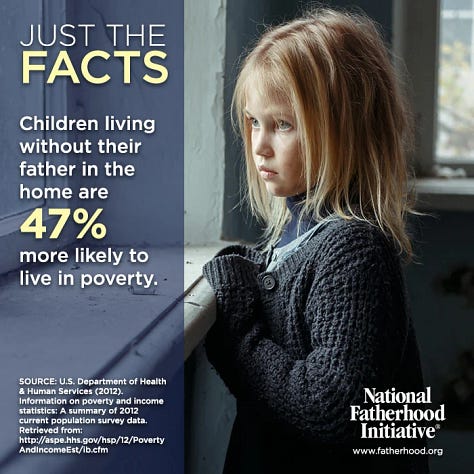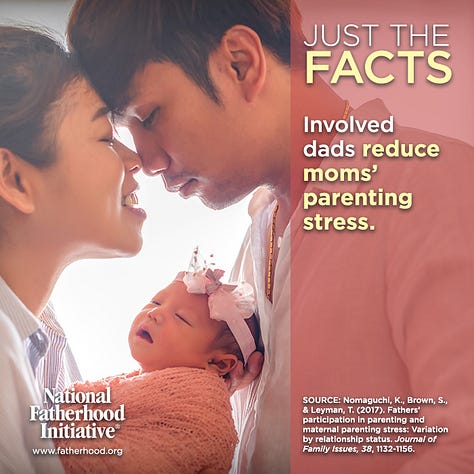Welcome to a special Broadway edition of The Musical Father!
There is an abundance of powerful data on the impact of involved fathers versus absent ones. I have seen the realities represented by the data over the past several years leading programs for at-risk fathers and families, first on the local level, and now on the national level. When I deliver workshops and keynotes on the importance of fathers, I share the relevant stats on father absence, which are typically met with a mix of raised eyebrows and nodding heads. But I find that stories help express the deeper heart of the matter—especially when those stories are artful, even musical.
This week on The Musical Father, I would like to take you on a detour from my main topic here—the devoted family life of J.S. Bach—to explore some powerful songs and stories from the world of musical theatre. These stories illustrate what can happen when fathers are not around as Bach was and will hopefully inspire you to love your family well and to understand and encourage the struggling moms, children, and dads around you.
I Dreamed a Dream
If you know just one musical, there is a good chance it is Les Misérables. I listened to the Original Broadway Cast Recording regularly on cassette as a teenager, and I was always touched by Fantine’s story. Early in the musical, she sings “I Dreamed a Dream,” as she exhausts every possible way of providing for her child, Cossette. After her death, the ex-convict Jean Valjean famously steps in to raise Cosette.
But there is a key missing character behind this narrative. In the masterpiece novel by Victor Hugo, we learn the young man’s name: Felix. Though Fantine’s first love, he leaves behind their shared season of revelry to return to a more responsible life, leaving nothing but a brief note. Felix does not that realize Fantine is pregnant or appreciate all she and her child will go through, even as he is welcomed back by his parents as a prodigal son returned.
We do not hear his name in the musical, but you may remember the powerful moment in the song where Fantine sings, “And still I dream he’ll come to me, that we will live the years together. But there are dreams that cannot be, and there are storms we cannot weather.”
I know how loyal people are to their favorite renditions of this song, so feel free to share yours in the comments. In addition to Randy Graff’s rendition on the Original Broadway Cast Recording, another favorite of mine is Lea Salonga’s from the 25th Anniversary Concert, which you can watch on YouTube.
Maybe This Time
Felix is not the only unspoken but influential name in a musical. In Cabaret, set in the last months of the Golden Twenties in Berlin, protagonist Sally Bowles finds herself pregnant and plans to get an abortion, something she says she has done many times. But as Cliff, the likely father of the baby, tries to talk Sally into keeping it, she pauses to wonder if this time might be different.
“Maybe this time, I’ll be lucky,” she sings. “Maybe this time, he’ll stay. Maybe this time, for the first time, love won’t hurry away. He will hold me fast. I’ll be home at last. Not a loser anymore, like the last time, and the time before.”
I got to play viola for a run of Cabaret when I was a new dad, and every night I would pour my heart into that song—this one potentially redemptive moment in an otherwise dark, raucous story. I wished that Sally could somehow trust Cliff’s offer of support, but I knew that her past had made that too difficult. Somewhere in the background of the story, perhaps before she became a performer at the Kit Kat Klub, multiple men had chances to stay as loving partners and devoted fathers. Perhaps some even promised to do so, yet each left—leaving Sally feeling defeated, longing for elusive peace and happiness.
In Act II, Sally gets the abortion, she and Cliff part ways, and she returns to the Kit Kat Klub to sing in the title song, “Life is a cabaret, old chum.”
Within months of playing this run of shows, I launched a program to coach new and expectant fathers in my city of Pittsburgh, helping men involved in uncertain situations not only state their support for their partner and child but to stay and grow and demonstrate their commitment.
There are several renditions of “Maybe This Time,” including one by Liza Minelli from the 1972 film. Within the story, Sally Bowles is not supposed to be as good of a singer as she thinks herself to be, so there is a wide range of interpretations.
She Used to Be Mine
In a more recent musical called Waitress, a pie baker named Jenna faces an unplanned pregnancy amid personal disappointment, an abusive marriage, and an affair with her OB-GYN. As she prepares, unsupported, for the birth of her child, she mourns the seeming loss of the girl she once was and knew in the song, “She Used to Be Mine.”
For some reason, my daughter Hannah loved this song when she was a small toddler, looking so sweet and somber whenever I would play it in the car and often asking for it to be repeated two or three times in a row.
After this number, Jenna finds new joy and purpose in motherhood and ends both her marriage and her affair to seek what’s best for her and her child. But the sadness in “She Used to Be Mine” that pulls at our hearts (even little Hannah’s) is echoed in another recent musical that shows some of the challenges that often face mothers and children in father-absent homes down the road.
“She Used to Be Mine” is written by Sara Bareilles and performed by her in the 2023 film adaption, but Broadway singer Jessie Mueller sings the definitive version on the Original Broadway Cast Recording, in my opinion.
Words Fail
In Dear Evan Hansen, we see the struggles of a single mother with her depressed teenage son whose father left when he was small. In “Words Fail,” Evan faces up to a mess he has made by pretending to be in a better family situation—one where the dad has stuck it out and the mom only needs to be the mom.
He weeps as he sings, “Sometimes, you see everything you wanted, and sometimes, you see everything you wish you had, and it’s right there, right there, right there in front of you. And you want to believe it’s true.”
Ben Platt does a phenomenal job in both The Original Broadway Cast Recording and the Original Motion Picture Soundtrack. If you have not seen the film, it will help you grapple with many realities facing young people today, especially those in father-absent homes.



Another Way
These songs resonate in our hearts and culture because we are surrounded and affected by similar hurts and brokenness every day. It is important to sit with these stories, especially if they can move us to understand and assist single mothers and children from father-absent homes. But identifying with their struggles, and even championing those who succeed against all odds, does not ultimately end the cycle. Girls raised in father-absent homes are more likely to experience teen pregnancy and raise children in father-absent homes, while boys raised in these homes are more likely to become absent fathers themselves.1
These musical stories should not only give us sympathy but also make us passionate about investing in our marriages and about mentoring those who have never experienced a healthy family life. Along the way, we should share and celebrate stories of those who took a venerable path—even if that path is considered by many to be boring and outdated.
“The most extraordinary thing in the world is an ordinary man and an ordinary woman and their ordinary children.” -G.K. Chesterton
If we are moved by the heartrending stories of broken families, we must also stop rolling our eyes at whole families. In my study of J.S. Bach, I regularly come across scholars who are frustrated at the boring nature of Bach’s life as a stationary family man. The approach present in his boring old life—in which he first married, then welcomed children as gifts (rather than trials) from God, and then stuck around as a loving husband and nurturing father—is the precise antidote to countless societal ills we face and sing about today. Bach’s example, though often unfollowed in the world of classical music, could bring new life to our profession and society.
One More Song
In my first year of marriage to my wife Angela, I was asked to play a song from the musical Hamilton called “Dear Theodosia” for a wedding. The song is sung by two fathers; Aaron Burr to his daughter Theodosia and Alexander Hamilton to his son Philip. They sing of their infants’ smiles and reflect on their own fathers; how they hope to do better than their fathers and create a better world for their children in young America. I listened to the song for the first time while driving home from somewhere, and the line, “When you came into the world you cried, and it broke my heart,” brought tears to my eyes. Wow, I want a little daughter, I realized.
The two men sing with hope to their children, “My father wasn’t around (my father wasn’t around). I swear that I’ll be around for you. I’ll do whatever it takes (I’ll make a million mistakes). I’ll make the world safe and sound for you.”
A little bit of encouragement goes a long way when folks are not sure how to get started in family life. With support and positive examples, fathers from difficult backgrounds involved in complicated situations (even many who are struggling with harmful behaviors) can become supportive co-parents and excellent fathers. I hope you will seek to build up struggling individuals like those in the songs above and also look out for the missing fathers who could make the greatest difference.
When Hamilton’s Angelica Tour came to Pittsburgh, I got to do a “pit sit” since I had several friends in the orchestra. It was phenomenal, and hearing “Dear Theodosia” live after the arrival of my first daughter was very special. I also enjoy the version of the song by Regina Spektor and Ben Folds on The Hamilton Mixtape.
National Fatherhood Initiative® 2024, Father Facts: Ninth Edition.




Great writing! You pulled in some powerful Broadway stories. I feel like you could do a similar analysis of Disney princess movies where the dads are usually dead, absent or portrayed as overly controlling. 😏
Such strong insight, Alex! I never thought about musicals from the perspective of the presence of fathers.